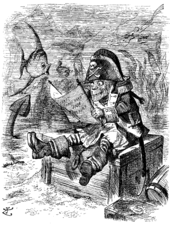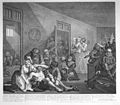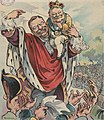The Cartoon Portal
A cartoon is a type of visual art that is typically drawn, frequently animated, in an unrealistic or semi-realistic style. The specific meaning has evolved, but the modern usage usually refers to either: an image or series of images intended for satire, caricature, or humor; or a motion picture that relies on a sequence of illustrations for its animation. Someone who creates cartoons in the first sense is called a cartoonist, and in the second sense they are usually called an animator.
The concept originated in the Middle Ages, and first described a preparatory drawing for a piece of art, such as a painting, fresco, tapestry, or stained glass window. In the 19th century, beginning in Punch magazine in 1843, cartoon came to refer – ironically at first – to humorous artworks in magazines and newspapers. Then it also was used for political cartoons and comic strips. When the medium developed, in the early 20th century, it began to refer to animated films that resembled print cartoons. (Full article...)

In print media, a cartoon is a drawing or series of drawings, usually humorous in intent. This usage dates from 1843, when Punch magazine applied the term to satirical drawings in its pages,[1] particularly sketches by John Leech.[2] The first of these parodied the preparatory cartoons for grand historical frescoes in the then-new Palace of Westminster in London.[3]

Selected article -
The Adventures of Tintin (Les Aventures de Tintin) is a series of comic strip narratives created by Georges Remi under the pseudonym Hergé (a reversal of his initials, R G, as pronounced in French). They first appeared in French in a children's supplement to the Belgian newspaper Le Vingtième Siècle in 1929. Set in a painstakingly researched world closely mirroring our own, The Adventures of Tintin present a number of well realised characters in distinctive settings. The series has continued as a favourite of readers and critics alike for over 70 years. The hero of the series is the titular character, Tintin, a young reporter and traveller. He is aided in his adventures from the beginning by his faithful dog Snowy (Milou in French). Later, popular additions to the cast included Captain Haddock and other colourful supporting characters. The success of the series saw the serialised strips collected into a series of albums, spun into a successful magazine and adapted for both film and theatre. The series is one of the most popular European comics of the 20th century, with translations published in over 50 languages and more than 200 million copies of the books sold to date.
Selected character -
Captain Marvel is a comic book superhero, originally published by Fawcett Comics and now owned by DC Comics. Created in 1939 by artist C.C. Beck and writer Bill Parker, the character first appeared in Whiz Comics #2 (Feb, 1940). With a premise that taps into adolescent fantasy, Captain Marvel is the alter ego of Billy Batson, a youth who works as a radio news reporter and was chosen to be a champion of good by the wizard Shazam. Whenever Billy speaks the wizard's name, he is instantly struck by a magic lightning bolt that transforms him into an adult superhero empowered with the abilities of six mythological figures. Several friends and family members, most notably Marvel Family cohorts Mary Marvel and Captain Marvel, Jr., can share Billy's power and become "Marvels" themselves. Hailed as "The World's Mightiest Mortal" in his adventures (and nicknamed "The Big Red Cheese" by archvillain Doctor Sivana, an epithet adopted by fans as a nickname for their hero), Captain Marvel was, based on sales, the most popular superhero of the 1940s, since the Captain Marvel Adventures comic book series sold more copies than Superman and other competing superhero books during the mid-1940s. Captain Marvel was also the first superhero to be adapted into film in 1941 (The Adventures of Captain Marvel). Fawcett ceased publishing Captain Marvel-related comics in 1953, dure in part to a copyright infringement suit from DC Comics alleging that Captain Marvel was an illegal infringement of Superman.
Did you know... -
- ...that 1999's Scooby-Doo! Mystery of the Fun Park Phantom was the first commercial Scooby-Doo computer game for the Windows platform?
- ...that the Fire Nation, from the Universe of Avatar: The Last Airbender, was inspired by photos of volcanic islands of Iceland and the Pacific Ocean?
- ...that Uri-On, created by Michael Netzer in 1987, was the first Israeli superhero to be published in color?
- ...that pixel artists are featured in an annual juried art show, "Into the Pixel", at the E3 trade show for computer and video game industries?
Selected list -
There have been 131 episodes of Ed, Edd n Eddy, an animated comedy television series created by Danny Antonucci and produced by Canada-based a.k.a. Cartoon. The series debuted on Cartoon Network in the United States on January 4, 1999, and ended on November 8, 2009, with the premiere of the series finale film Ed, Edd n Eddy's Big Picture Show. The series was originally planned to air for four seasons; however, Cartoon Network ordered two additional seasons and three holiday-themed specials as a result of its popularity. Reruns continue to air on Cartoon Network, including airing as part of the revived block Cartoon Planet. The series revolves around three adolescent boys collectively known as "the Eds", who live in a suburban cul-de-sac. Unofficially led by Eddy, the Eds constantly try to scam the fellow cul-de-sac children in order to purchase jawbreakers. The Eds' plans usually fail and leave them in various predicaments. The award-winning series garnered generally positive reviews, and remains the longest running original Cartoon Network series and Canadian-made animated series to date.
General images -
Selected biography -
Walter Elias "Walt" Disney (December 5, 1901 – December 15, 1966) was an American film producer, director, screenwriter, voice actor, animator, entrepreneur, entertainer, international icon and philanthropist. Disney is famous for his influence in the field of entertainment during the 20th century. As the co-founder (with his brother Roy O. Disney) of Walt Disney Productions, Disney became one of the best-known motion picture producers in the world. The corporation he co-founded, now known as The Walt Disney Company, today has annual revenues of approximately U.S. $35 billion. Disney is particularly noted for being a film producer and a popular showman, as well as an innovator in animation and theme park design. He and his staff created a number of the world's most famous fictional characters including Mickey Mouse, a character for which Disney himself was the original voice. He has won 26 Academy Awards out of 59 nominations, including a record four in one year, giving him more awards and nominations than any other individual. He also won seven Emmy Awards. He is the namesake for Disneyland and Walt Disney World Resort theme parks in the United States, as well as the international resorts in Japan, France, and China. Disney died of lung cancer in Burbank, California, on December 15, 1966.
Subcategories
WikiProjects
- Main projects
- Arts • Animation • Comics • Entertainment • Visual arts
- Related Projects
- Anime and manga • Biography • Film • Fictional characters • Media franchises • Music • Television • Video games
Selected quote -
Topics
- Comic book
- Comic strip
- Digital comics
- Graphic novel
- Mobile comic
- Motion comics
- Trade paperback
- Webcomic
- Animator
- Animation director
- Animation studios
- Animation film festivals
- Feature-length films
- Short films
- Television series
- Computer-animated films
- Stop-motion films
- Traditional animation
- Limited animation
- Rotoscoping
- Stop Motion
- Clay
- Cutout
- Graphic
- Model
- Object
- Pixilation
- Puppetoon
- Computer animation
- Flash animation
- PowerPoint animation
- SVG animation
- Cel-shaded animation
- Crowd simulation
- Morph target animation
- Motion capture
- Non-photorealistic rendering
- Skeletal animation
Things you can do

- Requested articles: Fenwick (comics), Khimaera (comics), Mutant Underground Support Engine, Bruce J. Hawker, Marc Dacier, Hultrasson, Frankenstein Comics, Dave Johnson (comics), Paco Medina, Dappere Dodo, New Adventures of the Space Explorers, Habatales, Musical Box, Foo-Foo (TV series), Bonne nuit les petits, The Adventures of Lariat Sam, More...
- Images and photos needed: Request images that are needed from Wikipedia requested images of comics and animation to included in each articles.
- Stubs: Work on stubs in articles in Comics and Animation stubs.
- Infobox: Add infobox that are needed from Category:Comics articles without infoboxes and Category:Animation articles needing infoboxes in articles.
- Deletion sorting: Please see the collection of discussions on the deletion of articles related to comics and animation - compiled by WikiProject Deletion sorting
Related portals
Associated Wikimedia
The following Wikimedia Foundation sister projects provide more on this subject:
-
Commons
Free media repository -
Wikibooks
Free textbooks and manuals -
Wikidata
Free knowledge base -
Wikinews
Free-content news -
Wikiquote
Collection of quotations -
Wikisource
Free-content library -
Wikiversity
Free learning tools -
Wiktionary
Dictionary and thesaurus
More portals
Sources
- ^ Punch.co.uk. "History of the Cartoon". Archived from the original on 2007-11-11. Retrieved 2007-11-01.
- ^ Adler & Hill 2008, p. 30.
- ^ "Substance and Shadow: Original Editorial Accompanying "Cartoon, No. I"". Victorian web.org. Retrieved 29 October 2023.





































